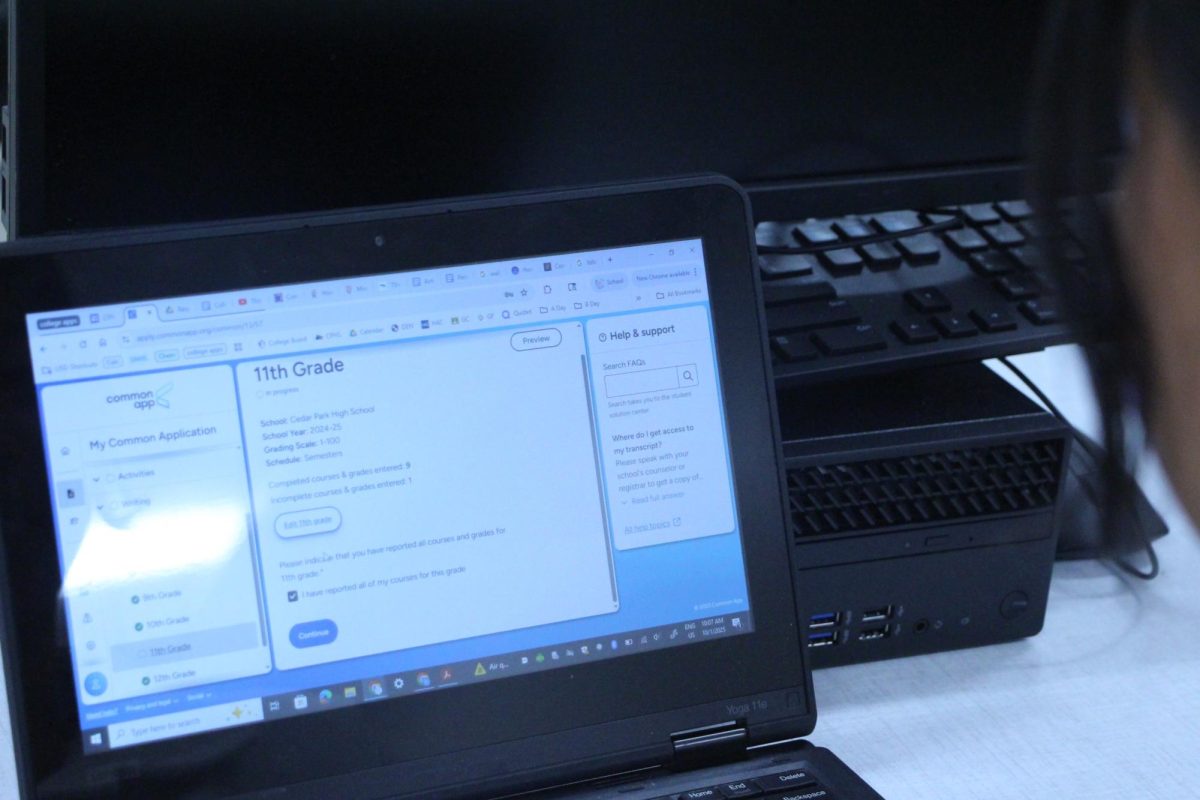The Internet (or “Net”) has been a place of exploration and refuge for many in this precarious day and age. People from all walks of life can congregate in one connected community, and interact in ways not believed possible only a few short decades ago. This united society has created a culture all its own, made of information from every region of the globe and completely dependent on the input and exchange of ideas and opinions. It is this cyber-culture that permeates the fabric of reality, and spawns phrases like “Google it.” This information superhighway is used by many in day-to-day life, and can be a crucial element to survival in this digital world.
“[The Net] is a good source of information and provides endless answers and it’s a good source of communication with other people,” Kellen Scott, sophomore, said.
Not only does it work as a figurative mirror to the global society, it is also the handiest encyclopedia, a shopping mall, a place for social gathering, and a billboard.
The Net is constantly shifting in response to popularity, information, the market and the economy. It has the capability to destroy the reputation and standing of whatever the public deems mock-worthy. Likewise, it retains the power to turn the obscure into celebrities (case and point: The Dramatic Chipmunk). The Internet depends on the continuous input and sharing of information. This is the only way it can continue to exist and evolve with the ever-changing norms of humanity. Luckily, with so much of the world plugged-in, an estimated 1.463 billion people, this feat is not too hard to accomplish.
The fact that this digital landscape has no real physical form is another interesting facet to its behavior. This being the case, strength, power and stature online is not measured by physical ability, but by net savvy, intelligence and digital aptitude. Due to these circumstances, a class of Internet “baddies” – comprised of identity thieves, online predators, cyber-bullies and virus writers – prey on the net-illiterate. Policing them is difficult because cyber law is only loosely governed by local enforcements, the principles of free speech and information and a mutual protocol developed by users.
These circumstances have led to an increase in online interaction and social networking, where millions of people can intermingle, make friends and even find soul mates without ever having met in person. Sites like Facebook, Myspace, even the oft forgotten Friendster, have let people connect in ways not possible before.
The ability to find old friends and make new ones has allowed a surge of chat systems, blogs, and online journals. A certain freedom of self-expression is a welcome outlet provided by the Internet. Independence from ridicule and mockery of real world interaction is an important factor to the trend of growing journal/blogging communities like Livejournal. They provide a place for a majority of people to vent their opinions, share stories and stay in contact with others. Musicians also use the Net as a creative outlet, gaining new audiences through Myspace music accounts. An obscure music explosion resulted from the greater use of social networking systems, connecting artists to fans in ways not possible before.
“I’m a big music person,” Laurie Prasifka, sophomore, said. “I’ll look at Emo’s website a lot to see who’s playing or I’ll look at band websites and see if they have any upcoming shows nearby.”
No site best exemplifies the basis of cyber culture like YouTube. The “most viewed” page changes faster than lightning on steroids and has more diversity than a college brochure. It’s easy to use and the operating format makes becoming an Internet sensation as easy as turning on a web-cam and lip-syncing a favorite song (a feat not so unheard of. NumaNuma ring any bells?). Viral videos, or any video that gains widespread popularity through the process of Internet sharing, have created phenomena the world over. Saturday Night Live’s digital shorts like Lazy Sunday or Tina Fey’s impersonation of Sarah Palin have had more hits and Google searches than the Jonas Brothers. Others of honorable mention are The Evolution of Dance, Obama Girl, and The Dancing Cadet. While Internet fame is an elusive and fickle temptress, she can often strike at the most unsuspecting victims and produce the most searing limelight ever experienced. This slight drawback is joined by a few other complaints.
“I don’t like how addicting [the Internet] is,” Prasifka said. “When I need to do projects on the computer, I always seem to get sidetracked.”
Safety is never assured on the great Digital Frontier, and the obstacles are real and heartbreaking. Carpal tunnel and “Rickrolling” have reached epidemic proportions, while crashing systems leave many desperate for WiFi connections. Search engines fail or come up short, and cUte_guurL993 won’t accept a friend request. However crazy this “Internet thing” may seem, it’s the driving force behind the social machine. It is the newfangled culture working for and against its creators to change the world, forever.








![As her hair blows in the wind, senior Brianna Grandow runs the varsity girls 5K at the cross country district meet last Thursday. Grandow finished fourth in the event and led the varsity girls to regionals with a third place placement as a team. “I’m very excited [to go to regionals],” Grandow said. “I’m excited to race in Corpus Christi, and we get to go to the beach, so that’s really awesome.” Photo by Addison Bruce](https://cphswolfpack.com/wp-content/uploads/2025/10/brianna.jpg)


![Broadcast, yearbook and newspaper combined for 66 Interscholastic League Press Conference awards this year. Yearbook won 43, newspaper won 14 and broadcast took home nine. “I think [the ILPC awards] are a great way to give the kids some acknowledgement for all of their hard work,” newspaper and yearbook adviser Paige Hert said. “They typically spend the year covering everyone else’s big moments, so it’s really cool for them to be celebrated so many times and in so many different ways.”](https://cphswolfpack.com/wp-content/uploads/2025/05/edited-ILPC.jpg)





![Sitting with her friend senior Sohpia Struve at last year’s Austin City Limits Festival, senior Ava Zuniga poses for a picture under a pavilion. They are frequent attendees at ACL, an annual music festival at Zilker Park. “I would recommend seeing a bunch of people,” Zuniga said. “This past year, we camped out for Chappell [Roan] for a really long time. I think the whole point of ACL, [which] is a lot of fun, is that you can go see so many different people, even if you don’t know them. So by camping by one person, it really limits yourself from being able to go see a bunch of people.” Photo courtesy of Ava Zuniga](https://cphswolfpack.com/wp-content/uploads/2025/10/EE9E9484-FE6F-4AA0-B5F5-0C177AB32841-1200x857.jpeg)
![Looking down at his racket, junior Hasun Nguyen hits the green tennis ball. Hasun has played tennis since he was 9 years old, and he is on the varsity team. "I feel like it’s not really appreciated in America as much, but [tennis] is a really competitive and mentally challenging sport,” Nguyen said. “I’m really level-headed and can keep my cool during a match, and that helps me play a bit better under pressure.” Photo by Kyra Cox](https://cphswolfpack.com/wp-content/uploads/2025/09/hasun.jpg)

![Bringing her arm over her head and taking a quick breath, junior Lauren Lucas swims the final laps of the 500 freestyle at the regionals swimming competition on date. Lucas broke the school’s 18-year-old record for the 500 freestyle at regionals and again at state with a time of 4:58.63. “I’d had my eye on that 500 record since my freshman year, so I was really excited to see if I could get it at regionals or districts,” Lucas said. “ State is always a really fun experience and medaling for the first time was really great. It was a very very tight race, [so] I was a bit surprised [that I medaled]. [There were] a lot of fast girls at the meet in general, [and] it was like a dogfight back and forth, back and forth.” Photo by Kaydence Wilkinson](https://cphswolfpack.com/wp-content/uploads/2025/03/Kaydence-2.7-23-edit-2.jpg)
![As the support team sits and poses for a photo in the cafeteria with the counseling team they eagerly wait to start their day. "We [all] seem to be a team, I get up every day and there's days where I don't want to go to work today, but I'm thankful that I have a job and I'm blessed to have what I have," Christopherson said. Photo Courtesy of Julie Weltens.](https://cphswolfpack.com/wp-content/uploads/2025/01/AF9E8470-10D7-4C91-BF28-EC8F86BAB66C-1200x852.jpeg)
![Jumping off the ground, senior linebacker Bennett Patton snatches the ball out of the air for an interception at Thursday’s game against Chaparral. Patton had two interceptions in the 56-14 victory, tying the school record for interceptions in a game. “I was just playing the game,” Patton said. “[I’m] going to go into next week, forget about it and stay humble.” Photo by Harper Chapman](https://cphswolfpack.com/wp-content/uploads/2025/09/bennett-interception.jpg)











